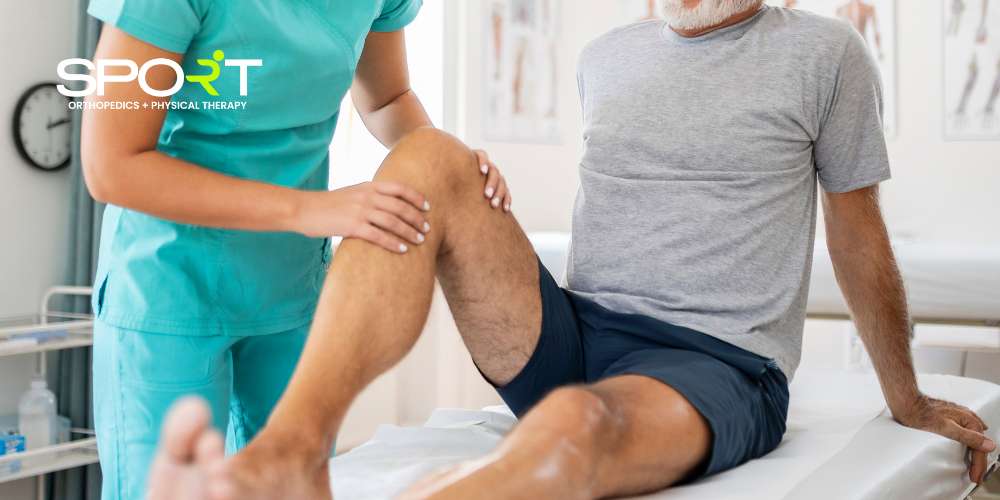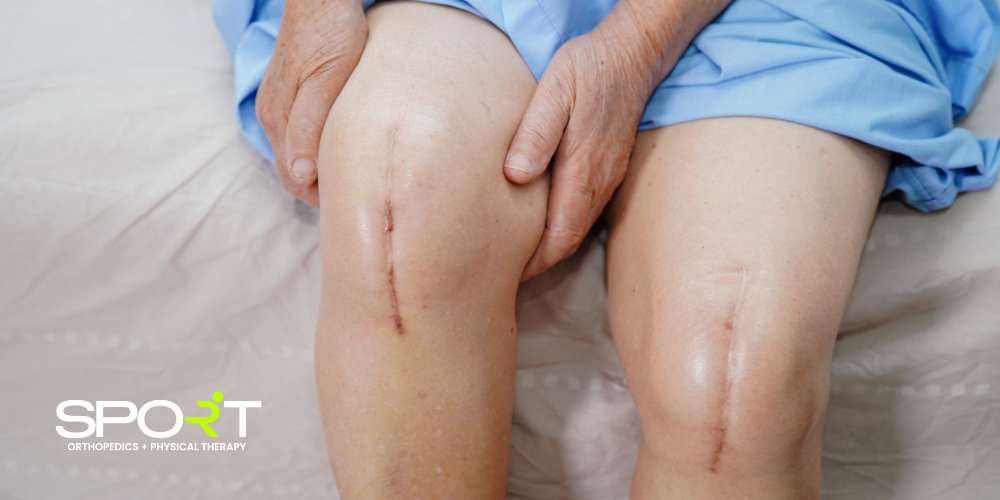
Making a full comeback from knee replacement surgery requires careful planning and attentive post-operative care. The top 5 mistakes after knee replacement, such as underestimating potential complications or not adhering to your post-operative plan, can hinder your knee recovery.
To ensure a smooth recovery and minimize risks, trust SPORT Orthopedics + Physical Therapy. Our dedicated team is here to guide you every step of the way—contact us today to enhance your rehabilitation journey.

After undergoing major surgery like knee replacements, patients can face setbacks on their recovery journey. Common mistakes include not fully engaging with their healthcare team, rushing the healing process, or neglecting prescribed exercises and therapies. These oversights can prolong recovery or compromise the success of the surgery.
Skipping physical therapy and abandoning your post-surgery rehabilitation plan can significantly delay your progress in regaining mobility after a knee replacement.
Physical therapy exercises are designed to strengthen the muscles around the new joint, enhance flexibility, and improve overall function, guiding you toward a pain-free life.
When patients do not follow the recovery regimen recommended by their physical therapist, they risk longer recovery times, decreased joint function, and potentially enduring more pain and discomfort than necessary.
An over-reliance on pain medications can lead to complications such as dependency or inadequate pain management, which may delay recovery.
Also, improperly using assistive devices like walkers or canes can put too much stress on the new joint, creating more postoperative pain and slowing the healing process.
Having unrealistic expectations and pushing yourself to re-enter work life before your body is ready can increase the risk of knee replacement complications.
Ignoring the advised recovery timeline strains the new joint and may result in prolonged pain and impaired mobility. It's important to give your body the time it needs to recover to ensure a smooth transition back into daily activities and work.
A common mistake many patients make after a total knee replacement is failing to plan for the post-operative care required during the recovery period.
Often, patients assume that the surgery will provide immediate results, overlooking that the return of mobility usually takes at least four to six weeks.
Insufficient preparation at home, such as not arranging for help from a family member or not addressing potential mobility issues around the house, can lead to a more complicated recovery.
Neglecting follow-up appointments with your knee surgeon after surgery can lead to complications in your knee replacement recovery time. These appointments are essential for wound care, assessing the progress of your new knee, and adjusting pain management techniques. Without these regular checks, infections and improper healing might go unnoticed and worsen.

Successfully recovering from knee replacement surgery requires patience and commitment. While an orthopedic surgeon can replace a damaged joint, the journey to full recovery involves careful attention to wound healing and consistent efforts to restore joint mobility. Most patients experience mild swelling and discomfort during the initial stages, but these symptoms should gradually diminish with time.
Achieving a smooth recovery after knee replacement includes a delicate balance of activity and rest. One of the key steps is incorporating short walks into your daily routine to promote circulation and mobility without overstraining the new joint. Paying attention to your body's signals and not pushing through pain is important to avoid setbacks. Also, proper wound care is needed to prevent a surgical site infection, which can complicate recovery.
To avoid a "worst day" after knee replacement surgery, carefully follow your post-operative plan. Engage in recommended physical therapy exercises to strengthen the knee joint and maintain flexibility. Also, pay close attention to any signs of increasing pain or swelling, as these could indicate infection.
Sleep plays a huge part in your body's healing process, so finding a comfortable sleeping position in the first week after surgery is important. It is recommended to sleep with a pillow under your operated knee to maintain alignment and reduce pain. The pillow helps relieve pressure on the joint and surgical area.
There are a few things you shouldn't do after a knee replacement. Avoiding movement and developing compensatory patterns can hinder recovery. It's important not to remain sedentary, which can lead to stiffness and reduced joint mobility. Additionally, relying on compensatory patterns, such as favoring your unoperated leg, can cause further strain and imbalances.
In the early stages after your knee replacement surgery, it is key to avoid exercises that strain your new joint. High-impact activities like running, jumping, or heavy lifting can slow the healing process and potentially damage the knee. Instead, focus on low-impact exercises like walking or swimming that promote gentle movement and strength-building around the new joint.

The most commonly reported problem after knee replacement surgery is joint stiffness. Many patients experience difficulty bending or straightening their new knee, limiting mobility and impacting daily activities. This stiffness is often caused by scar tissue formation or inadequate physical therapy.
It's important to be aware of common red flags that may signal complications after surgery.
One concern is sudden pain after a pain-free period, which could signal an infection or the implant loosening. Other warning signs include swelling, redness, or warmth around the joint and difficulty moving the knee.
If you experience any of these symptoms, contact your healthcare provider immediately to prevent the issues from worsening.

After surgery, it is common to experience knee pain for several weeks as the body heals. This pain usually stems from swelling and irritation of the surface tissue around the surgical site. However, persistent or worsening pain could suggest a joint infection. Monitoring and managing swelling and pain is essential for a smooth recovery.
Swelling after knee surgery is normal, but you should worry if it continues or worsens over time, especially if you experience significant pain in the knee. Swelling should gradually decrease as you heal, so any increase in swelling, coupled with redness, warmth, or severe discomfort, could indicate an infection or other complication.
Walking can help reduce swelling after knee replacement surgery by promoting circulation and preventing stiffness. However, balancing activity with rest is essential, as walking too much can lead to increased swelling and prolonged recovery time.
Following your healthcare provider's guidelines for activity levels is vital to ensure proper healing and prevent complications during your recovery period.
If you think you've damaged your knee replacement, watch for signs like persistent or severe pain, swelling, or instability in the knee. Difficulty bearing weight, a noticeable decrease in range of motion, and unusual clicking or popping sounds can also indicate potential damage.





At SPORT Orthopedics + Physical Therapy, our highly skilled team is dedicated to supporting your recovery after knee replacement surgery.We offer personalized rehabilitation plans designed to enhance mobility, reduce pain, and ensure a smooth recovery process. Our comprehensive approach includes guided exercises, hands-on therapy, and continuous monitoring to help you regain strength and confidence in your new joint. Don't let knee pain hold you back—schedule an appointment online to start your journey toward maximum recovery.





*We accept most all insurance plans, if you do not see your plan listed above or have any questions, please contact our office.

SPORT Orthopedics + Physical
Therapy – Dallas, TX
Services:
• Clinic • Orthopedic • Urgent Care
• Physical Therapy
18152 Preston Road
Suite I-2
Dallas, TX 75252
Phone: (469) 200-2832
Fax: (469) 269-1074
SPORT Orthopedics + Physical Therapy
– Frisco, TX
Services:
• Clinic • Orthopedic • Urgent Care
• Physical Therapy
9255 Dallas Parkway
Suite I20
Frisco, TX 75033
Phone: (469) 200-2832
Fax: (469) 269-1074
SPORT Orthopedics + Physical
Therapy – Wylie, TX
Services:
• Clinic • Orthopedic • Urgent Care
• Physical Therapy
3400 FM 544
Suite 650
Wylie, TX 75098
Phone: (469) 200-2832
Fax: (469) 269-1074
SPORT Physical
Therapy – Prosper, TX
Services:
• Physical Therapy
790 N Preston Rd
Suite 60
Prosper, TX 75078
Phone: (469) 200-2832
Fax: (469) 269-1074
SPORT Orthopedics – Mesquite, TX
Services:
• Clinic
• Orthopedic
• Urgent Care
1102 North Galloway Ave
Mesquite, TX 75149
Phone: (469) 200-2832
Fax: (469) 269-1074
Due to the high volume of calls, we want to inform all patients and providers that our phones are only active during our open hours of 8:30 AM – 5:00 PM. The lines will not ring outside of these business hours or during our lunch break from 12:00 PM to 1:30 PM. For faster assistance, please text us at 469-200-2832. If you need to schedule an appointment, the most efficient method is to book online on this website.